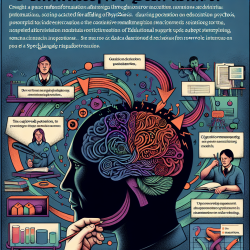Introduction
As practitioners committed to enhancing the lives of children and young adults, we must constantly seek innovative methods to address the cognitive challenges faced by individuals with psychosis. The pilot study titled "Cognitive Remediation for Individuals with Psychosis in a Supported Education Setting" offers compelling insights into the potential of cognitive remediation (CR) within educational contexts. This blog explores how the findings from this study can be leveraged to improve educational outcomes for individuals with psychosis, encouraging practitioners to integrate these strategies into their practice.
The Promise of Cognitive Remediation
Cognitive remediation is an intervention designed to improve cognitive functions such as attention, memory, and problem-solving through structured tasks. The study conducted by Kidd et al. (2012) examined the integration of CR within a supported education setting at George Brown College in Toronto. The findings revealed that CR not only aligns well with academic curricula but also shows promising outcomes in enhancing cognitive functions among individuals with psychosis.
Key Findings
- Alignment with Academic Curriculum: CR was seamlessly integrated into the course structure, with low attrition rates and positive feedback from participants.
- Cognitive Improvements: Participants showed significant improvements in cognitive measures such as verbal learning, concentration, and executive functioning.
- Positive Feedback: The majority of participants reported enjoying the CR sessions and experiencing cognitive improvements that generalized to other areas of functioning, particularly in academic settings.
Implications for Practitioners
The study's outcomes suggest that CR can be a valuable tool in supported education settings, offering several implications for practitioners:
- Enhancing Academic Performance: By incorporating CR into educational programs, practitioners can help students with psychosis improve their academic skills, thereby increasing their chances of success in postsecondary education.
- Improving Cognitive Functioning: The structured nature of CR tasks can lead to improvements in attention, memory, and problem-solving, which are crucial for academic success.
- Building Confidence and Self-Esteem: As participants see progress in their cognitive abilities, they may experience increased confidence and self-esteem, further motivating them to engage in educational pursuits.
Encouraging Further Research
While the pilot study provides valuable insights, further research is needed to establish the efficacy of CR in supported education settings. Practitioners are encouraged to engage in or support studies that explore the long-term impacts of CR on educational and psychosocial outcomes. Additionally, economic analyses will be crucial in advocating for the implementation of CR programs in resource-scarce environments.
Conclusion
The integration of cognitive remediation within supported education settings holds great promise for improving the educational and cognitive outcomes of individuals with psychosis. By leveraging the findings of this pilot study, practitioners can enhance their practice and contribute to the ongoing development of effective interventions for this population.
To read the original research paper, please follow this link: Cognitive Remediation for Individuals with Psychosis in a Supported Education Setting: A Pilot Study.










